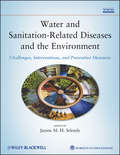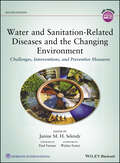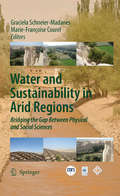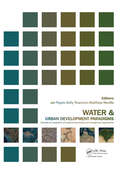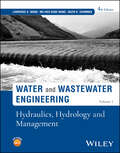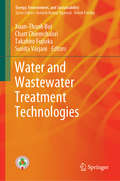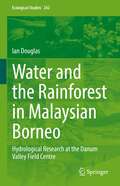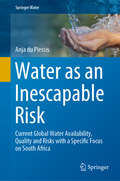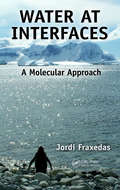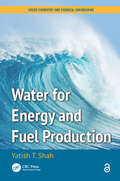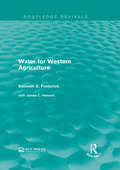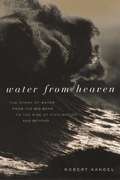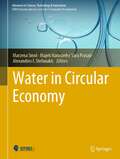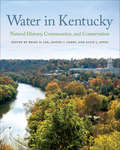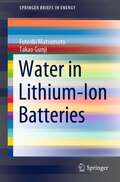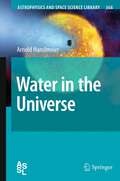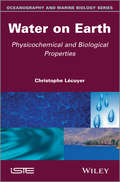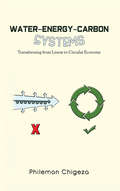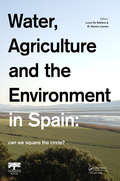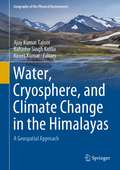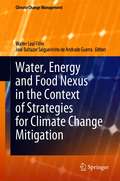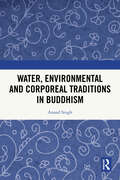- Table View
- List View
Water and Sanitation Related Diseases and the Environment
by Janine M. SelendyWritten by authorities from various related specialties, this book presents the most complete treatment possible of the conditions responsible for water- and sanitation-related diseases, the pathogens and their biology, morbidity and mortality resulting from lack of safe water and sanitation, distribution of these diseases, and the conditions that must be met to reduce or eradicate them. Preventive measures and solutions are presented throughout. This book is an essential resource for all graduate students, postdoctoral scholars, and professionals in infectious disease, public health and medicine, chemical and environmental engineering, and international affairs.Key features:Provides a comprehensive understanding of the interconnection among many factors related to water-related diseases, sanitation and hygieneBrings together experts from various specialties to address each area covered and to assist in bringing about the understanding of those interconnectionsProvides examples of successful interventions with knowledge about how they were brought about so that information can be use to replicate the initiative in full or in partProvides an appreciation of the concerns and solutions addressed from an international perspective with high and low technological solutionsProvides insight into the international dimension of these concerns and how they can be best addressedFour hours of accompanying multimedia DVD on two discsLearn more about this title and share information with colleagues and friends using this three-page flier: http://www.solutions-site.org/dvd/insert.pdf
Water and Sanitation-Related Diseases and the Changing Environment: Challenges, Interventions, and Preventive Measures
by Janine M. SelendyThe revised and updated second edition of Water and Sanitation Related Diseases and the Changing Environment offers an interdisciplinary guide to the conditions responsible for water and sanitation related diseases. The authors discuss the pathogens, vectors, and their biology, morbidity and mortality that result from a lack of safe water and sanitation. The text also explores the distribution of these diseases and the conditions that must be met to reduce or eradicate them. The text includes contributions from authorities from the fields of climate change, epidemiology, environmental health, environmental engineering, global health, medicine, medical anthropology, nutrition, population, and public health. Covers the causes of individual diseases with basic information about the diseases and data on the distribution, prevalence, and incidence as well as interconnected factors such as environmental factors. The authors cover access to and maintenance of clean water, and guidelines for the safe use of wastewater, excreta, and grey water, plus examples of solutions. Written for students, and professionals in infectious disease, public health and medicine, chemical and environmental engineering, and international affairs, the second edition of Water and Sanitation Related Diseases and the Changing Environment isa comprehensive resource to the conditions responsible for water and sanitation related diseases.
Water and Sustainability in Arid Regions
by Graciela Schneier-Madanes Marie-Francoise CourelInternational voices fill the pages of Water and Sustainability in Arid Regions, forming an original scientific exploration of current water research and management issues. In arid regions, agriculture that is ill-adapted to the environment, accelerated urbanization, poverty, and increasing pollution challenge access to and uses of water. Understanding these issues requires incorporating findings from both the physical and social sciences at different temporal and spatial scales. The chapters in this book were written by hydrologists, remote sensing specialists, ecologists, historians, economists, political scientists, architects, archaeologists, and other experts who live in and study arid lands. The authors present updates, overviews, and analyses of water challenges these areas have faced and are striving to address, from salinization in the fabled Taklimakan Desert in China to land degradation in the northern Mediterranean to groundwater over-exploitation in the southwestern United States. The book also examines desertification, remote sensing, qanat systems, architecture, arsenic contamination, and other case studies from Iran, the Maghreb region, Argentina and Chile, and Mexico. From this conceptual mosaic of comparative perspectives and research methods emerges a strong assumption: an interdisciplinary approach that combines physical and social sciences is the first step toward globally and comprehensively addressing water and sustainability."This book is a valuable and welcome contribution to the discussion of water and sustainable development. Through the collection of chapters, the book clearly illustrates the contemporary diversity of approaches to water scarcity and presents pertinent and new research findings that readers generally do not find compiled together. The result is a highly relevant, accessible, and timely resource that is unique in its international and interdisciplinary content. This is a must-read for anyone working on environmental and sustainability issues in arid lands."André Mariotti, University Pierre et Marie Curie, and INSU - CNRS (National Institute for Earth Sciences and Astronomy-National Center for Scientific Research/Centre National de la Recherche Scientifique), France "Anyone who reads this book will find himself or herself contemplating the need to rethink how we approach the issue of water and sustainability in arid lands. Drawing on the expertise of both physical and social scientists, the chapters taken as a whole present global, historic, and current perspectives on water scarcity in a multi-layered way that rarely has been done before." Miguel Solanes, Madrid Water Institute, Spain
Water and Urban Development Paradigms: Towards an Integration of Engineering, Design and Management Approaches
by Kelly Shannon Jan Feyen Matthew NevilleCommunication across and integration of disciplines in the urban-water sector seems today more imperative than ever before. Water is a strategic and shrinking resource. It is probably the world's most valuable resource and clean water has even been touted as the 'next oil'. Control of water - from access to management - has always been a
Water and Wastewater Engineering, Volume 1: Hydraulics, Hydrology and Management
by Lawrence K. Wang Nazih K. Shammas Mu-Hao Sung WangWATER and WASTEWATER ENGINEERING The classic guide to water and wastewater engineering returns Water and wastewater engineering is a crucial branch of civil engineering, dealing with water resources and with the challenges posed by water and wastewater. Generations of engineers have developed techniques for purifying, desalinating, and transforming water and wastewater, techniques which have only grown more critical as climate change and global population growth create new challenges and opportunities. There has never been a more urgent need for a comprehensive guide to the management of water and its various engineering subdisciplines. Water and Wastewater Engineering: Hydraulics, Hydrology and Management, 4th edition offers key fundamentals in a practical context to engineers and engineering students. Updated to address growing urbanization and industrialization, with corresponding stress on water and wastewater systems, this vital textbook has been fully revised to reflect the latest research and case studies. This volume focuses primarily with hydrology and hydraulics, along with chapters treating groundwater and surface water sources. Readers of Hydraulics, Hydrology and Management will also find: Coverage of water supply, water sources, water distribution, and more Detailed treatment of both sanitary sewer and urban stormwater drainage In-depth analysis of infrastructure issues with respect to water resources, pumping, and handling This textbook is ideal for advanced students in civil, environmental, and chemical engineering departments, as well as for early career engineers, plant managers, and urban and regional planners.
Water and Wastewater Management: Global Problems and Measures (Water and Wastewater Management)
by Müfit Bahadir Andreas HaarstrickThis volume addresses the situation of water and wastewater management from a global angle, underpinned by selected case studies. Without doubt, water and wastewater management are among the greatest challenges of our century, and there is also no doubt that the challenges posed by climate change will become even greater. However, most efforts, especially in developing countries but also in the so-called developed countries, have been less than optimal or not optimal at all. In particular, there are still too many people who have to live without clean water and decent sanitation. Today, 2.2 billion people lack access to safely managed drinking water and wastewater, and 4.2 billion people lack safely managed sanitation services. The question, why this is so and why in many cases in developing countries, is discussed in this book among other urgent water and wastewater management issues.The publication of this book is the start of a book series that in more detail critically reviews, discusses, and analyzes the water and wastewater situation and management in different regions and countries worldwide.
Water and Wastewater Treatment Technologies (Energy, Environment, and Sustainability)
by Sunita Varjani Xuan-Thanh Bui Chart Chiemchaisri Takahiro FujiokaThis book discusses major technological advances in the treatment and re-use of wastewater. Its focus is on both novel treatment strategies and the modifications and adaptions of conventional processes to optimize the treatment of a complex variety of pollutants, including organic matter, chemicals and micropollutants in different water resources, as well as the integration of water treatment with bioelectricity production. Written by leading researchers in the field, it will be of interest to a wide range of researchers in both industry and academia.
Water and the Rainforest in Malaysian Borneo: Hydrological Research at the Danum Valley Field Studies Center (Ecological Studies #242)
by Ian DouglasThis volume synthesizes and analyzes thirty years of hydrological research in the Danum Valley Conservation Area, a lowland dipterocarp rainforest in Sabah, Malaysia. Ian Douglas explores the role of water in the rainforest ecosystem, setting out the ecological, climatological and geological context of present-day hydrological processes, soil erosion and stream sedimentation. He emphasizes the role of extreme events and natural disturbances in sediment supplies and the evolution of drainage pathways and explains the pathways of rainfall and stream sediment. Douglas then explores the impacts caused by logging, the extreme pulses of sedimentation and the effects of log removal and logging road construction, examining the effects of major storms in the 20 years after tree harvesting. Methods of minimizing logging damage to soils and streams are discussed and the effects on flora and fauns are considered.
Water as an Inescapable Risk: Current Global Water Availability, Quality And Risks With A Specific Focus On South Africa (Springer Water)
by Anja Du PlessisThe book presents an interdisciplinary systematic evaluation of increasing water stress and scarcity over the globe and specifically South Africa. South Africa is used as the prime example as the country is experiencing similar water challenges in terms of availability and quality as most regions across the globe. Water availability is predominantly used to illustrate water scarcity however, continued degradation of the world’s freshwater resources, by a multitude of natural and anthropogenic factors, have consequently exacerbated water stress and scarcity due to it being of insufficient quality for various uses. The increase of water scarcity through both natural and anthropogenic factors has in turn led to water being viewed as an increasing risk within all spheres. Water as a source of conflict has come to the forefront especially within regions which struggle to meet the increasing demands from different water users and trying to achieve future sustainability of the resource. The increase of water scarcity and stress as well as the continued pressure of population and economic growth has brought various new challenges into play. This book focuses on water as an increasing risk over the globe and specifically South Africa by reviewing both water availability and quality, evaluating water as a global and national risk. The book concludes by focusing on current limitations, necessary strategic actions as well as possible policy-related changes which may be required to adapt to future water challenges and to lessen water as an increasing risk.
Water at Interfaces: A Molecular Approach
by Jordi FraxedasWater, with its simple molecular structure, reveals a complex nature upon interaction with other molecules and surfaces. Water at Interfaces: A Molecular Approach provides a broad, multidisciplinary introduction to water at interfaces, focusing on its molecular characteristics. The book considers interfaces at different length scales from single wa
Water for Energy and Fuel Production (Green Chemistry And Chemical Engineering Ser. #17)
by Yatish T. ShahThis text describes water's use in the production of raw fuels, as an energy carrier (e.g., hot water and steam), and as a reactant, reaction medium, and catalyst for the conversion of raw fuels to synthetic fuels. It explains how supercritical water is used to convert fossil- and bio-based feedstock to synthetic fuels in the presence and absence of a catalyst. It also explores water as a direct source of energy and fuel, such as hydrogen from water dissociation, methane from water-based clathrate molecules, and more.
Water for Western Agriculture (Routledge Revivals)
by Kenneth D. FrederickThis title, originally published in 1982, examines the importance of western irrigation to U.S. agriculture and the impacts of the changing water supply situation on the development of western irrigation. Past trends, water supply conditions, water institutions, economic forces, technological alternatives, and environmental factors are examined for their impacts on the course of western irrigation. Water for Western Agriculture will be of particular interest for students studying environmental issues.
Water from Heaven: The Story of Water from the Big Bang to the Rise of Civilization, and Beyond
by Robert KandelFrom where—and what—does water come? How did it become the key to life in the universe? Water from Heaven presents a state-of-the-art portrait of the science of water, recounting how the oxygen needed to form H2O originated in the nuclear reactions in the interiors of stars, asking whether microcomets may be replenishing our world's oceans, and explaining how the Moon and planets set ice-age rhythms by way of slight variations in Earth's orbit and rotation. The book then takes the measure of water today in all its states, solid and gaseous as well as liquid. How do the famous El Niño and La Niña events in the Pacific affect our weather? What clues can water provide scientists in search of evidence of climate changes of the past, and how does it complicate their predictions of future global warming? Finally, Water from Heaven deals with the role of water in the rise and fall of civilizations. As nations grapple over watershed rights and pollution controls, water is poised to supplant oil as the most contested natural resource of the new century. The vast majority of water "used" today is devoted to large-scale agriculture and though water is a renewable resource, it is not an infinite one. Already many parts of the world are running up against the limits of what is readily available. Water from Heaven is, in short, the full story of water and all its remarkable properties. It spans from water's beginnings during the formation of stars, all the way through the origin of the solar system, the evolution of life on Earth, the rise of civilization, and what will happen in the future. Dealing with the physical, chemical, biological, and political importance of water, this book transforms our understanding of our most precious, and abused, resource. Robert Kandel shows that water presents us with a series of crucial questions and pivotal choices that will change the way you look at your next glass of water.
Water in Biomechanical and Related Systems (Biologically-Inspired Systems #17)
by Adam GadomskiThe contributed volume puts emphasis on a superior role of water in (bio)systems exposed to a mechanical stimulus. It is well known that water plays an extraordinary role in our life. It feeds mammalian or other organism after distributing over its whole volume to support certain physiological and locomotive (friction-adhesion) processes to mention but two of them, both of extreme relevance.Water content, not only in the mammalian organism but also in other biosystems such as whether those of soil which is equipped with microbiome or the ones pertinent to plants, having their own natural network of water vessels, is always subjected to a force field.The decisive force field applied to the biosystems makes them biomechanically agitated irrespective of whether they are subjected to external or internal force-field conditions. It ought to be noted that the decisive mechanical factor shows up in a close relation with the space-and-time scale in which it is causing certain specific phenomena to occur.The scale problem, emphasizing the range of action of gravitational force, thus the millimeter or bigger force vs. distance scale, is supposed to enter the so-called macroscale approach to water transportation through soil or plants’ roots system. It is merely related to a percolation problem, which assumes to properly inspect the random network architecture assigned to the biosystems invoked. The capillarity conditions turn out to be of prior importance, and the porous-medium effect has to be treated, and solved in a fairly approximate way.The deeper the scale is penetrated by a force-exerting and hydrated agent the more non-gravitational force fields manifest. This can be envisaged in terms of the corresponding thermodynamic (non-Newtonian) forces, and the phenomena of interest are mostly attributed to suitable changes of the osmotic pressure. In low Reynolds number conditions, thus in the (sub)micrometer distance-scale zone, they are related with the corresponding viscosity changes of the aqueous, e.g. cytoplasmatic solutions, of semi-diluted and concentrated (but also electrolytic) characteristics. For example, they can be observed in articulating systems of mammals, in their skin, and to some extent, in other living beings, such as lizards, geckos or even insects. Through their articulating devices an external mechanical stimulus is transmitted from macro- to nanoscale, wherein the corresponding osmotic-pressure conditions apply.The content of the proposed work can be distributed twofold. First, the biomechanical mammalian-type (or, similar) systems with extraordinary relevance of water for their functioning will be presented, also including a presentation of water itself as a key physicochemical system/medium. Second, the suitably chosen related systems, mainly of soil and plant addressing provenience, will be examined thoroughly. As a common denominator of all of them, it is proposed to look at their hydrophobic and/or (de)hydration effects, and how do they impact on their basic mechanical (and related, such as chemo-mechanical or piezoelectric, etc.) properties. An additional tacit assumption employed throughout the monograph concerns statistical scalability of the presented biosystems which is equivalent to take for granted a certain similarity between local and global system’s properties, mostly those of mechanical nature. The presented work’s chapters also focus on biodiversity and ecological aspects in the world of animals and plants, and the related systems. The chapters’ contents underscore the bioinspiration as the key landmark of the proposed monograph.
Water in Circular Economy (Advances in Science, Technology & Innovation)
by Alexandros I. Stefanakis Majeti Narasimha Vara Prasad Marzena SmolThis book presents possible solutions for a circuler economy (CE) in the water and wastewater sector through an inventory of multidisciplinary knowledge with high scientific and practical importance which can contribute to support the transition to the CE model in water and wastewater sector. Water in modern studies exceeds being an important source for irrigation and drinking. It is now a significant source of renewable energy and a catalyst in most industrial and manufacturing products. The protection and sustainable management of water resources and water-based waste (as wastewater, sewage sludge, or sewage sludge ash) are important aspects of the CE, which is defined as a regenerative growth model that gives back to the planet more than it takes. Our book, entitled "Water in Circular Economy", delivers a comprehensive overview of the latest research covering the following aspects of water management from the perspective of the CE implementation: · Water as a key resource in the circular economy; · Innovative solutions in transition to the circular economy in water and wastewater sector; · Monitoring of circular economy implementation in water and wastewater sector.
Water in Kentucky: Natural History, Communities, and Conservation
by Brian D. Lee, Daniel I. Carey, And Alice L. JonesTwenty-three essays examining the biophysical and the historical and contemporary stories of water&’s impact on communities throughout Kentucky. Home to sprawling Appalachian forests, rolling prairies, and the longest cave system in the world, Kentucky is among the most ecologically diverse states in the nation. Lakes, rivers, and springs have shaped and nourished life in the Commonwealth for centuries, and water has played a pivotal role in determining Kentucky&’s physical, cultural, and economic landscapes. The management and preservation of this precious natural resource remain a priority for the state&’s government and citizens. In this generously illustrated book, experts from a variety of fields explain how water has defined regions across the Commonwealth. Together, they illuminate the ways in which this resource has affected the lives of Kentuckians since the state&’s settlement, exploring the complex relationship among humans, landscapes, and waterways. They examine topics such as water quality, erosion and sediment control, and emerging water management approaches. Through detailed analysis and case studies, the contributors offer scholars, practitioners, policy makers, and general readers a wide perspective on the state's valuable water resources.Praise for Water in Kentucky &“Simply outstanding! Water in Kentucky offers an exciting close-up view of what happens to the water that falls on the Commonwealth. You&’ll be fascinated by the many innovative projects your neighbors are implementing to clean polluted runoff and to restore attractive wetlands and streams. This volume will guide you in taking action to improve water quality in your community for the benefit of people, plants, and wildlife.&” ―Thomas R. Biebighauser, author of Wetland Drainage, Restoration, and Repair &“This collection of 23 essays expertly covers the intricate relationship between water and our daily lives. These essays could easily serve as springboards for conversation in conservation and policy implementation for the future. This book stands as an important addition to the study of water resources in Kentucky.&” ―Kentucky Libraries &“A labor of love and a remarkable example of persistence and commitment by its editors Brian D. Lee, Daniel I. Carey, and Alice L. Jones, and a wide variety of invited contributors. This book goes a long way toward weaving together many perspectives to create a better overall picture of the relevance of water in Kentucky.&” ―Groundwater
Water in Lithium-Ion Batteries (SpringerBriefs in Energy)
by Futoshi Matsumoto Takao GunjiThis book reviews the impact of water content in lithium-ion batteries (LIBs) as well as the reactivity of anodes, cathodes and electrolytes with water and processes that provide water-resistance to materials in LIBs. Water in LIBs which were constructed with anode, cathode and organic electrolyte containing lithium salts can degrade the cell performance and seriously damage the materials present. However, because a small amount of water in cells contributes to the formation of the solid electrolyte interphase, complete removal of water from cells lowers the battery performance and increases costs due to removal of water from the battery materials. This book presents the optimal concentration of water for each battery material along with appropriate removal methods and water-scavengers which were developed recently to establish both high performance and lower costs. Moreover this book describes the development of anodes and cathodes prepared by aqueous process and aqueous LIBs in which aqueous electrolytes containing lithium salts are used as an electrolyte. This book will be useful not only for academic researchers but also for company researchers who deal with LIBs.
Water in the Universe
by Arnold HanslmeierDue to its specific chemical and physical properties, water is essential for life on Earth. And it is assumed that this would be the case for extraterrestrial life as well. Therefore it is important to investigate where water can be found in the Universe. Although there are places that are completely dry, places where the last rainfall happened probably several 100 million years ago, surprisingly this substance is quite omnipresent. In the outer solar system the large satellites of Jupiter and Saturn are covered by a thick layer of ice that could be hiding a liquid ocean below. This of course brings up the question of whether the recently detected extrasolar planets could have some water on their surfaces and how we can detect this. Water molecules are also found in interstellar gas and dust clouds. This book begins with an introductory chapter reviewing the physical and chemical properties of water. Then it illuminates the apparent connection between water and life. This is followed by chapters dealing with our current knowledge of water in the solar system, followed by a discussion concerning the potential presence and possible detection of water on exoplanets. The signature of water in interstellar space and stars are reviewed before the origin of water in the Universe is finally discussed. The book ends with an appendix on detection methods, satellite missions and astrophysical concepts touched upon in the main parts of the book. The search for water in the Universe is related to the search for extraterrestrial life and is of fundamental importance for astrophysics, astrobiology and other related topics. This book therefore addresses students and researchers in these fields.
Water on Earth: Physicochemical and Biological Properties
by Christophe LécuyerThe presence of water on Earth is discussed in this book using various theories about its origin as a basis. These theories include a massive degassing of the primitive parent bodies that built our planet as well as a late addition from comets that collided with the Earth’s surface. The extraordinary physico-chemical properties of the water molecules, combined with its abundance and distribution over the Earth’s surface, have contributed to regulating the global climate and favoring species’ evolution for more than 4 billion years. The early emergence of life in the deep ocean and its further diversification were closely linked to the global water cycle whose dynamics result from the energy balance between solar radiation and the internal heat flux of the Earth. Chapter 1 of this book deals with the extraordinary physico-chemical properties of the water molecule while Chapter 2 provides insight on theories regarding the origin of water on Earth. In the third chapter, the author focuses on the chemical composition of the main water reservoirs of our planet. Chapters 4 and 5 discuss water’s relationship with plate tectonics and life, respectively. The sixth and final chapter uses stable isotope tracking to look into the water cycle and past climates. Contents 1. Water: A Molecule Endowed with Extraordinary Physicochemical Properties.2. Theories about the Origin of Water on Earth.3. The Main Water Reservoirs on Earth and their Chemical Composition.4. Water and Plate Tectonics.5. Water and Life.6. Stable Isotope Tracking: Water Cycles and Climates of the Past. The presence of water on Earth is discussed on the basis of the various theories about its origin such as a massive degassing of the primitive parent bodies that built our planet as well as a late addition from comets that collided with its surface. The extraordinary physico-chemical properties of the water molecule combined with its abundance and distribution over the Earth’s surface have contributed to regulating the global climate and favoring the evolution of species for more than 4 billion years. The early emergence of life in the deep ocean and its further diversification were closely linked to the global water cycle whose dynamics result from the energy balance between solar radiation and the internal heat flux of the Earth.
Water without Borders?
by Karen Bakker Emma S. Norman Alice CohenSince 1909, the waters along the Canada-US border have been governed in accordance with the Boundary Water Treaty, but much has changed in the last 100 years. This engaging volume brings together experts from both sides of the border to examine the changing relationship between Canada and the US with respect to shared waters, as well as the implications of these changes for geopolitics and the environment. Water without Borders? is a timely publication given the increased attention to shared water issues, and particularly because 2013 is the United Nations International Year of Water Cooperation.Water without Borders? is designed to help readers develop a balanced understanding of the most pressing shared water issues between Canada and the United States. The contributors explore possible frictions between governance institutions and contemporary management issues, illustrated through analyses of five specific transboundary water "flashpoints." The volume offers both a historical survey of transboundary governance mechanisms and a forward-looking assessment of new models of governance that will allow us to manage water wisely in the future.
Water – Energy – Carbon Systems: Transitioning from Linear to Circular Economy
by Philemon ChigezaThis book proposes an imaginative, timely and new approach that advances affordable, reliable and sustainable management strategies on water, energy and carbon systems for local communities. The book targets non-academic and academic readers and has the potential to help individuals and organizations to develop sustainable management plans. The book addresses all of humanity, especially young people developing their vocations and future careers to transition to the circular economy. The book is also of special interest to educators, environmental groups, policymakers, and environmentalists.
Water, Agriculture and the Environment in Spain: can we square the circle?
by M. Ramón Llamas Lucia De Stefano"The world water problems are a due to bad governance, not to physical water scarcity."This book is inspired by this statement and explores whether it holds in a specific country, Spain, where climatic conditions - Spain is one of the most arid countries of the European Union - would fully justify saying that water problems are due to physical wate
Water, Cryosphere, and Climate Change in the Himalayas: A Geospatial Approach (Geography of the Physical Environment)
by Kireet Kumar Ajay Kumar Taloor Bahadur Singh KotliaThis edited book summarizes numerous research studies on remote sensing and GIS of natural resource management for the Himalaya region done by Indian Institutions and Universities over the last decade. It gives an overview of hydrometeorological studies on Himalayan water resources and addresses concerns in the development of water resources in this region, which is dealing with an increased pressure in population, industrialization and economic development. While the source of some of the major rivers of India are found in the Himalayas, the glaciers and water bodies in the region are continuously shrinking leading to a depletion of water and deterioration of water quality. This is affecting a population of up to 2.5 billion people. The ecosystems have been under threat due to deforestation, loss of biodiversity, expansion of agriculture and settlement, overexploitation of natural resources, habitat loss and fragmentation, poaching, mining, construction of roads and large dams, and unplanned tourism. Spaceborne remote sensing with its ability to provide synoptic and repetitive coverage has emerged as a powerful tool for assessment and monitoring of the Himalayan resources and phenomena. This work serves as a resource to students, researchers, scientists, professionals, and policy makers both in India and on a global level.
Water, Energy and Food Nexus in the Context of Strategies for Climate Change Mitigation (Climate Change Management)
by Walter Leal Filho José Baltazar Salgueirinho de Andrade GuerraThis book focuses on climate change and sustainable development, showcasing examples of research, projects and other initiatives aimed at educating various target groups. Helping readers gain a better understanding of the water, energy and food nexus challenges in the context of climate change, and featuring valuable insights that can be implemented in other areas, it will appeal to researchers and students as well as practitioners.
Water, Environmental and Corporeal Traditions in Buddhism
by Anand SinghThis book examines ancient Buddhist traditions centered around water. It studies the sustainability and conservation practices of Buddhist monastics and examines how these early practices and ethos are applicable in the contemporary world. The author draws on literary and archaeological sources across cultures and religions to trace the different socio-economic and cultural traditions that utilise water, to formulate a pathway to save water in its purest form.A unique contribution, this book will be an essential read for scholars and researchers of environmental studies, climate change, sustainable development, religious studies, and Buddhist history. It will also be useful to environmentalists and policymakers.
